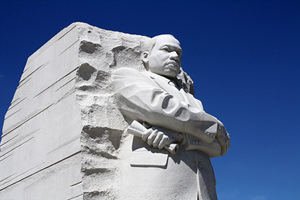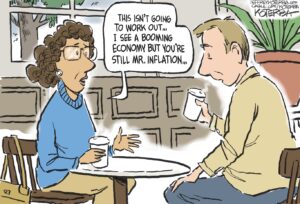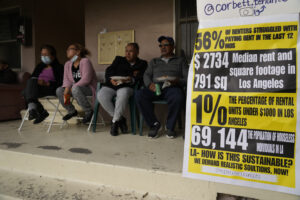MLK’s Vision of Justice
King was a passionate advocate for economic justice, speaking not just for African-Americans but for all Americans seeking to pull themselves out of poverty and dysfunction. On this score, we haven't just failed to make sufficient progress. We've stopped trying.
As the nation honors the Rev. Martin Luther King Jr. with a stirring new memorial on the National Mall, let’s not obscure one of his most important messages in a fog of sentiment. Justice, he told us, is not just a legal or moral question but a matter of economics as well.
In this sense, we’re not advancing toward the fulfillment of King’s dream. We’re heading in the opposite direction.
Aug. 28, the day organizers chose for the dedication of the King memorial (the ceremony was postponed because of Hurricane Irene), is the anniversary of the 1963 march and rally at which King delivered the indelible “I Have a Dream” speech. That event — one of the watershed moments of 20th century America — was officially called the “March on Washington for Jobs and Freedom.” Meaningful employment was a front-and-center demand.
The idea and impetus for the march came from A. Philip Randolph, one of the most important labor leaders in the nation’s history. Randolph founded the Brotherhood of Sleeping Car Porters, a union that demanded and won decent pay and better working conditions for thousands of railroad employees, most of them African-American. By 1963, Randolph had become a vice president of the AFL-CIO labor federation.
King and his fellow civil rights leaders understood the importance of good jobs that paid a living wage — and the social and economic mobility such jobs provide — in forging a nation that honors its promise of fairness and equality. If he and Randolph were alive today, given the devastating blows that poor and working-class Americans have suffered, I’m confident they’d be planning a “March on Washington for Jobs and Freedom II.”
As an African-American old enough to remember Jim Crow segregation in the South, I’m amazed at the progress toward racial justice. We’re not all the way there yet, but we’re light-years from where we started.
King was a passionate advocate for economic justice, speaking not just for African-Americans but for all Americans seeking to pull themselves out of poverty and dysfunction. On this score, we haven’t just failed to make sufficient progress. We’ve stopped trying.
With unemployment above 9 percent, what task absorbs our elected leaders? Certainly not an urgent search for ways to put people back to work. Instead, we’re obsessed with deficit-reduction measures that, if applied in the short term, would destroy jobs rather than create them.
Look beyond the recession. Between the end of World War II and the end of the Vietnam War, the typical income for an American household roughly doubled (in inflation-adjusted dollars). Since then, the Economist magazine noted last year, income for a typical household rose by just 22 percent — and even this modest increase was due to the fact that women entered the work force in large numbers. The Pew Research Center found that if you look just at men in their 30s, they earned 12 percent less in 2004 (again, inflation-adjusted) than their fathers did at a similar age.
As everyone knows by now, the top 1 percent of earners capture an increasing share of national income. The rich, without a doubt, are getting richer. The middle class and the working class are seeing their incomes stagnate or fall. The federal minimum wage of $7.25 an hour is an outrage. Food, clothing, housing and transportation on $7.25 an hour? There aren’t enough hours in the week.
It’s no coincidence that this massive transfer of wealth — basically, from workers to investors — took place at a time when union membership was in steep decline. In 1983, according to the federal Bureau of Labor Statistics, 20.1 percent of wage and salary workers belonged to a union. In 2010, only 11.9 percent were union members.
The result? In 2010, the median weekly pay of a male worker over 25 who belonged to a union was $982, according to BLS. The comparable figure for a worker not represented by a union was $846.
King was assassinated in Memphis, where he was supporting the demands of sanitation workers for more pay, better working conditions and the right to unionize. The civil rights leader was increasingly focused on the economic dimension of the freedom struggle, and was planning a massive Poor People’s Campaign at the time of his death.
The new King memorial is inspirational. When I visited Wednesday, the crowd of visitors was large, diverse and generally awe-struck at the memorial’s simplicity and power. Once again, the great man stands in Washington to challenge our morality, our faith and our conscience.
Eugene Robinson’s e-mail address is eugenerobinson(at)washpost.com.
© 2011, Washington Post Writers Group
Your support matters…Independent journalism is under threat and overshadowed by heavily funded mainstream media.
You can help level the playing field. Become a member.
Your tax-deductible contribution keeps us digging beneath the headlines to give you thought-provoking, investigative reporting and analysis that unearths what's really happening- without compromise.
Give today to support our courageous, independent journalists.






You need to be a supporter to comment.
There are currently no responses to this article.
Be the first to respond.